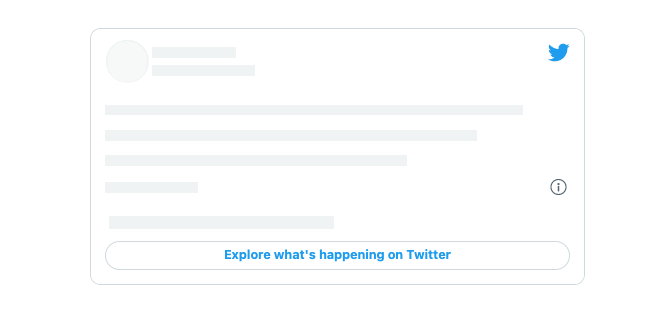The edit tweet button isn’t Twitter’s only new feature that can rewrite history. The company has apparently changed the way it handles embedded tweets that were deleted after the fact, littering webpages across the internet with holes.
Previously, a deleted tweet embedded in a webpage would still display the text content of a tweet. Now that text is gone, showing only a blank box. Twitter is altering webpages with deleted embedded tweets by hiding the text with Javascript — a choice that has many developers and open web advocates up in arms.
In a blog post, IndieWeb developer and former Google Developer Advocate Kevin Marks slammed Twitter’s change, likening it to “tampering with the public record.” Marks cites former President Trump’s since-deleted tweets as an example of content in the public interest that should remain available, adding that Twitter’s new approach toward deleted embedded tweets is “disturbing.”
In a tweet replying to Marks’ concerns, Twitter Senior Product Manager Eleanor Harding said that Twitter is seeking to “better respect when people have chosen to delete their Tweets” with the change. Harding said that the deleted tweet embeds would soon display a message rather than just leaving a completely blank box, which is what’s happening right now.

Marks isn’t the only one raising concerns that the ahistorical approach to old tweets will damage the web.
“Twitter is doing more than just preserving the privacy of people who choose to delete their tweets: they’re using Javascript to retroactively hide the quoted plain text in their embeds, even though it’s still there in the HTML,” said Andy Baio, who created the virtual event platform Skittish and previously served as the CTO of Kickstarter. “This is a huge problem for preserving the historical record.”
“… Anyone writing on the web could have used a screenshot of a tweet or just quoted the text, but had the confidence of knowing that if an embedded tweet was deleted, the plain text would still remain. Twitter broke that pact by changing this behavior.”
Twitter announced Tuesday that it would soon be testing editable tweets through Twitter Blue, its premium subscription service. Between the change to embedded tweets and that controversial news, the company seems to be moving toward a philosophy that puts its users’ intentions first, well above any concerns around archiving historical content. But the feature’s critics argue that giving users free rein to change their tweets after the fact could worsen some of Twitter’s most intractable platform problems, including harassment and misinformation.
Much like public reception of the once-mythological edit tweet button, people are likely to be split on if Twitter deleting bits of the internet’s collective memory is a good move or an ominous step in the wrong direction. There’s a natural tension between the ethos of the “right to be forgotten” movement, which seeks to empower people to have certain kinds of content about them deleted from the internet, and the researchers, developers and other open information advocates that view the web as a living document — one to be updated constantly but never altered outright.

